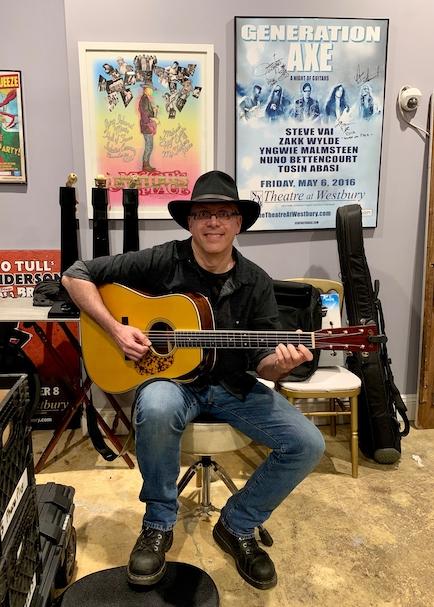Shaugn O'Donnell
Deputy Dean, Humanities & Arts
Professor, Popular Music Studies
Areas of Expertise/Research
- Music Analysis
- Music Theory
- Guitar
Building
North Academic Center (NAC)
Office
5/225
Phone
212-650-8166

Shaugn O'Donnell
Profile
I'm a guitarist and analytical musicologist whose scholarly interests include post-tonal theory, formal analysis, and rock music, particularly improvisation and psychedelia. The music of the Grateful Dead has been my primary research area in recent years.
Scholarship
Recent Work (~10 years)
“'Think this through with me': Harmonic Relations in a 1973 Palindrome.” In “Songs to Fill the Air:” Musicological Essays on the Grateful Dead. Duke University Press, forthcoming.
“‘Beneath the calm face of the sea,’ aggregate completion in ‘Crazy Fingers’.” Popular/American Culture Association Annual Conference. New Orleans, LA. April 19, 2025.
“Prepare Yourself to Be Open”: In Memoriam, Phil Lesh.” Popular/American Culture Association Annual Conference. New Orleans, LA. April 18, 2025.
“More Weir(d) Guitar.” Popular/American Culture Association Annual Conference. Chicago, IL. March 29, 2024.
“A Lost Prelude: When Robert Hunter Directed the Grateful Dead.” Popular/American Culture Association Annual Conference. Chicago, IL. March 29, 2024.
“Weir(d) Rhythm Guitar” Popular/American Culture Association Annual Conference. San Antonio, TX. April 7, 2023.
“Rambling and Wandering: Grateful Dead Harmonic Progressions.” In The Grateful Dead Studies Association Proceedings, Volume 2 (2022): 46–61. Originally presented at the Popular/American Culture Association Annual Conference. Virtual Conference (Seattle, WA). April 15, 2022.
“What Does Psychedelic Music Sound Like?” Popular/American Culture Association Annual Conference. Virtual Conference (Boston, MA). June 3, 2021.
“Workingman’s Dead?” Southwest Popular/American Culture Association Annual Conference. Albuquerque, NM. February 21, 2020.
“‘Silence in the Studio!’: Collage as Retransition in Pink Floyd’s ‘Atom Heart Mother Suite’.” The Routledge Companion to Popular Music: Expanding Approaches, edited by Ciro Scotto, Kenneth Smith, and John Brackett. Routledge, 2018.
“Psychedelic Masquerade: Sgt. Pepper and the Summer of Love.” Revisiting the Summer of Love, Rethinking the Counterculture. San Francisco, CA. July 29, 2017. Also presented at the Summit of Creativity: A Celebration of the Beatles’ Sgt. Pepper’s Lonely Hearts Club Band. Ann Arbor, MI. June 1, 2017.
“There’s Nothing Like A Grateful Dead Analysis.” “All Graceful Instruments,” The Grateful Dead in Context – An Interdisciplinary Symposium. New York, NY. June 23, 2017.
“The Road[s] Not Taken.” Southwest Popular/American Culture Association Annual Conference. Albuquerque, NM. February 16, 2017.
Courses
Recent classes:
- Listening to Pink Floyd
- Fretboard Skills
Additional classes:
- Rock Analysis
- Post-Tonal Theory
- Tonal Harmony
Education
Ph.D., Music Theory (1997)
The Graduate Center, CUNY